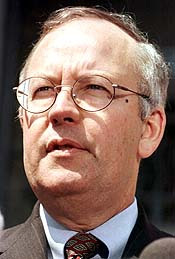
COMPLETE STARR REPORT (LINK)
THE STARR REPORT'S DESCRIPTIONS OF 7 SEXUAL ENCOUNTERS BETWEEN LEWINSKY AND CLINTON
Why was the Report so Graphic?
One of the most common criticisms of the Starr Report was that it had too much sex in it--far more than necessary to serve legitimate prosecutorial goals. Does this criticism have merit?
Without a doubt, some discussion of the sexual nature of the relationship between President Clinton and Monica Lewinsky was needed to establish that Clinton had lied in his deposition in the Paula Jones case and in his subsequent grand jury testimony. In both instances, Clinton denied under oath that he touched Lewinsky erotically. To expose these lies, Starr could have simply listed sexual encounters by date and place, including a brief description of the sexual content, such as "Lewinsky fellated the President" or the "President touched Lewinsky's breasts."
The Starr Report, however, went far beyond establishing that the President lied when he denied having sexual relations with Lewinsky, and included sexual details of various encounters that suggest the Report also had as its purpose to embarrass Clinton and thus limit his effectiveness as President. Perhaps no detail revealed in the Starr Report better illustrates this prosecutorial overkill than the decision to include a description of Clinton putting a cigar in Lewinsky's vagina, then putting it in his own mouth and saying that it "tastes good" (3-31-96). The cigar incident would inspire countless jokes by late-night comics and greatly weakened the ability of the President to ever again be seen as "presidential." The same good be said of the Starr Report's description of the President masturbating in a sink in his bathroom, its description of Clinton taking calls from members of Congress while receiving oral sex, or its mention of a more traditional form of "phone sex" between Lewinsky and the President.
The American people--most of them, anyway--learned far more about the President's private behavior from the Starr Report than they ever wanted to or needed to. As Judge Richard Posner (a respected federal appeals court judge appointed by President Reagan) observed in An Affair of State: The Investigation, Impeachment, and Trial of President Clinton, the details "are a distraction to anyone who wants to understand and evaluate Clinton's Presidency or the role and function of the President in American government and society." Posner also noted that details such as the cigar story were no doubt difficult on Clinton's family and close friends because they made it more difficult for them to "avert their eyes, as it were, from the relationship with Lewinsky."
One can only speculate on Starr's reasons for including such distracting and embarrassing details in his report. It is conceivable that he somehow believed them critical to making his case for Clinton's guilt, but it is far more likely that he had come to detest the President and the President's most vocal supporters, probably for the very understandable reason that he had been viciously--and at times unfairly--attacked by them. Yet, as Judge Posner observed, "We expect better from our prosecutors;...they are not to hate their quarry."
